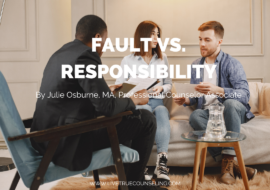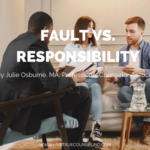Laughter can lead us to connection
I’m funny. At least, I think I am. I remember being funny when I was a kid. My older sister and I used to lie down in the hallway in our house when we were young (and bored) and I could make her laugh until she was crying without even tickling her. We were gifted a tape recorder once when we were young, which resulted in an entire afternoon of howling laughter. I remember that we recorded ourselves telling each other knock-knock jokes. One of the jokes went like this:
Knock knock.
Who’s there?
Burton.
Burton who?
Burton up your overcoat!
In our delirium of laughter, “burton” became “burpin’” and we laughed ourselves silly pretending to be “burpin’ up your overcoat.” The fact that I remember this joke 40 years later is a testament to just how funny we thought this was.
And even though I still think I’m funny now (and often remind my partner of this fact), I don’t find that I laugh like I used to when I was young. None of us do. We’re taught to be good adults who eschew silliness and who know that there’s a time and a place for laughter. Even when we do laugh, we don’t laugh with the same abandon that we used to. Remember what it was like to laugh and not care what you sounded like, how loud you were, or who was around? More often than not, we now laugh politely, which seems like an oxymoron to me.
Why laughter is good for us
One might make the argument that as we grow older, there seems less to laugh about. There are so many stressors in our lives – finances, jobs, families, aging, the political climate, global warming. But that’s exactly why we need laughter more than ever. Laughing is good for our health. It can help relieve tension, it can counter anger, and it even boosts our immune system. All of those stressors in our lives won’t go away if we laugh more – but their effect on us may be different.
Laughter can also help us connect to others. When someone is funny or laughing, we want to be around that person. Their laughter may even be contagious – we want to laugh with them. And the same is true for us. When we laugh, others want to be around us. Think about spending time with a friend or family member. When the friend or family member is depressed or just talks about bad things that have happened to them or if they’re negative all of the time, we feel drained being around that person. But if the person instead is full of laughter and humor and positivity, we feel buoyed and lighter in their presence. We want to be around them more. We want to connect with them.
Why laughter works
When we experience an emotion, we can see the effect that emotion has on certain areas of the brain. Most emotions only affect very specific areas of the brain. But laughter causes activity throughout the brain. Humor is complex. Part of the brain analyzes the joke, another part is involved in emotional responses to the analysis, another part of the brain works to “get” the joke, and yet another part of the brain stimulates a physical response to the joke. Tension and surprise are elements of the things that make us laugh (which is why we can’t tickle ourselves). Think about a joke with a punch line. The punch line is always funnier if it’s not what we expect. Think about watching a tense situation in a movie and the relief we feel when someone in the movie cracks a joke. That joke allows us to get rid of some of the pent-up tension that has built up within us and we feel relieved.
I once read an article (that unfortunately was so long ago that I can no longer find it) that talked about the benefits of just smiling. The article described a study that was done with folks with cancer. These folks were asked to look in the mirror and smile at themselves once a day. The idea is that even as our brain recognizes that it’s us, our brain doesn’t care – it just sees that someone is pleased with us and we feel better.
This ties into another article I came across about a Smile Mirror that has been recommended to those with cancer. The mirror does not show a reflection unless it detects smiling. This forces the person with cancer to smile if they want to see their reflection. The idea is that we feel better when we smile, even if it’s an obligatory smile. Not only do laughter and smiling both decrease stress and boost our immune system, but we trick our brain into thinking that something good has happened when we smile. And when we see others smiling (or ourselves in a mirror), it feels like a reward to our brain.
Laughter isn’t always possible
I’ll admit it. The article about the Smile Mirror made me angry when I read it. Who are we to force anyone to smile – especially someone who has cancer? What if they don’t want to feel better? Is their smile more for us than for them? I’ve been fortunate enough so far in my life never to have had cancer, but I think I’d feel pretty resentful of someone telling me how I should feel. Mental and physical illness and distress are no laughing matter. Some people don’t have the luxury of smiling and laughter all of the time.
One of these people is author Jenny Lawson, otherwise known as “The Bloggess.” In her first book, Let’s Pretend This Never Happened: A Mostly True Memoir, readers were treated to the epic adventures of a humorist who grew up in a bizarre household with taxidermy and live bobcats. It’s not until her next book, Furiously Happy: A Funny Book About Horrible Things, that the reader finds out that Ms. Lawson struggles with a debilitating mental illness. Her blog and her social media posts aren’t always funny. Much of the time she details her daily struggles to leave the house or sometimes even her bed. Sometimes she just doesn’t have any space for humor.
But Ms. Lawson does incorporate humor into her writing (and from the looks of it, into her everyday life) when she does have the space for it. When we’re struggling and stuck in a situation that we don’t see a way out of, humor is one thing we can try when something has to give. Just as going outside can sometimes help when we’re feeling depressed, laughter can be one antidote that we try when we feel despair. The idea is that laughter engages a different part of our brain. This can sometimes shift our perspective or the way we feel enough that we start to see other possibilities. Things may not seem as bleak.
Laughter is just the start
In her Netflix special, Nanette, Hannah Gadsby tells us, “Laughter is not our medicine. Stories hold our cure. Laughter is just the honey that sweetens the bitter medicine” (2018). I agree with this. While laughter and smiling can disrupt a rut that we’re in and can help us feel better in the short-term, I think the main benefit is that laughter connects us with others. This connection to others is crucial in our lives. Connecting with others gives an us outlet to tell our stories – and to hear others’ stories as well. When we tell our stories and have that deep connection with others, we feel validated as humans. Telling our stories can help us feel understood and accepted by others. It can help us feel that we’re not alone in the world.
Therapy
Therapy might be the place we start telling our stories to others, and so finding a therapist who is the right fit for you is critical. It might be the place where we start feeling understood and accepted for who we are – not who we think we should be or who someone else wants us to be, but who we are right now. Finding a therapist with a sense of humor that matches yours can help you connect to them. It can help build the therapeutic relationship. And it can help you feel comfortable if you feel anxious at all about engaging in therapy.
References/Further Reading
Brain, M. (2019, August 7). How Laughter Works. Retrieved October 24, 2019, from https://science.howstuffworks.com/life/inside-the-mind/emotions/laughter.htm.
Gadsby, H. (2018). Nanette. written and performed by Hannah Gadsby, Netflix, Guesswork Television.
Gold, H. (2017, October 25). This Mirror That Forces People to Smile Is Going to Piss Everyone Off. Retrieved October 24, 2019, from https://jezebel.com/this-mirror-that-forces-people-to-smile-is-going-to-pis-1819828956.
Kavilanz , P. (2017, October 24). High-tech mirror for cancer patients only works if you smile. Retrieved October 24, 2019, from https://money.cnn.com/2017/10/24/technology/smile-mirror-cancer-patients/index.html.
Robinson, L., Smith, M., & Segal, J. (2019, June 24). Laughter is the Best Medicine. Retrieved October 24, 2019, from https://www.helpguide.org/articles/mental-health/laughter-is-the-best-medicine.htm.
Jenny Larson loves her work as a therapist at Live True Counseling and as a Volunteer Counselor at William Temple House. When not seeing clients, she can be found reading psychology books and celebrity memoirs, watching bad (good) 80s movies, and sewing or baking. While self-identified as a cat person, she also has a fondness for dogs and other animals.









